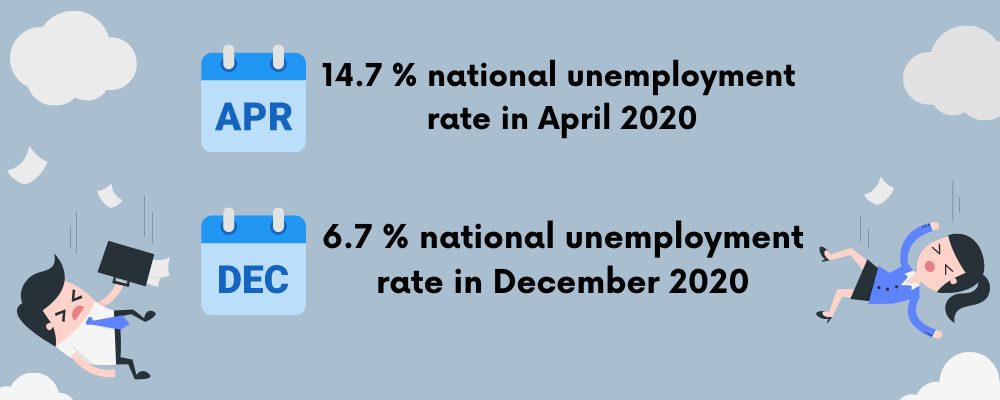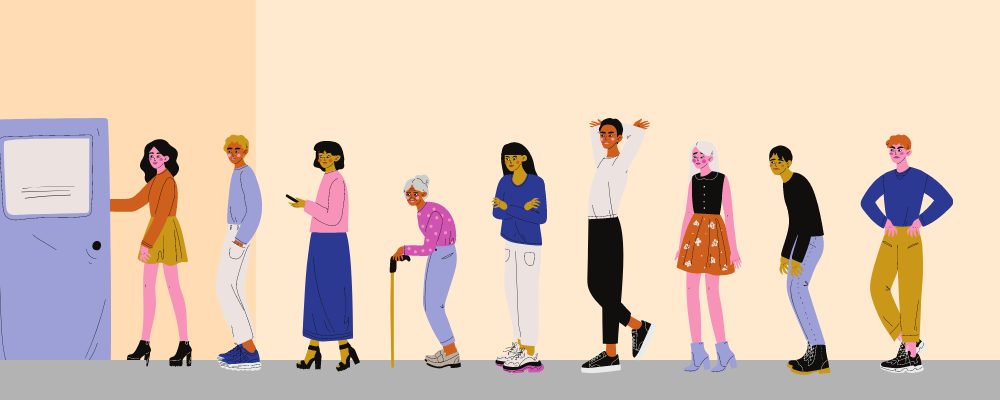The top 7 trends you need to know when hiring in 2021
Hiring in 2021 comes with some familiar sights from 2020, and a few new trends to watch out for. With the unemployment rate at a minuscule 3.6 percent in January 2020, U.S. employers started the year with the belief that filling openings would probably prove their toughest challenge. Nobody would have predicted that within weeks a global pandemic would shake up virtually every aspect of business operation.
Fast forward one year. Companies continue to adjust to circumstances, but the air of uncertainty still weighs heavy. Predicting hiring trends in such an atmosphere is not easy. From where things stand, however, the following appear likely to happen in 2021.

1. Applicant pools will remain large
A national unemployment rate of 6.7 percent in December 2020 certainly presents a better scenario for job seekers than the 14.7 percent experienced last April. However, the fact remains that numerous people are still searching for employment. A large applicant pool, however, does not always translate into a qualified one. Many folks apply to everything for which they might stand a chance with the hope of landing something.
Expect HR departments to continue relying on Applicant Tracking Systems (ATS) to bring the cream to the surface and stay organized. Likewise, a renewed interest in solid, tailored cover letters may occur as employers look for candidates to make a case as to why they’re a good match for this particular job.
2. Zoom interviews will continue to be popular in 2021
Many companies continue to operate remotely. Others have limits on who they can let in the building. Regardless of the reason for each business, hiring in 2021 will continue to have a remote spin. Virtual interviewing, especially at the early stages, remains a safer option — though not always a preferable one. Many hiring managers are nervous about bringing aboard someone they have not met in person. As a result, some organizations are putting applicants through extra interviews and online assessments to gain greater confidence in their final hiring decision.
3. Hiring managers will look for more than hard skills
Educational attainment and specific knowledge still have their place when filling roles, but the pandemic has elevated the importance of various other qualifications. Employers want to see evidence of adaptability, self-motivation, and ability to succeed in a remote environment. Candidates who demonstrate how they meet performance metrics regardless of the challenges thrown their way gain an edge in a year of continuing uncertainty.
4. Remote work will impact the decisions of both employers and employees
Forced into remote arrangements during the COVID-19 crisis, some employers aren’t looking back. A lack of geographical boundaries globalizes recruitment possibilities and can cut down on workplace overhead. Likewise, the pandemic introduced more people to the work-life benefits of telecommuting. Companies looking to hire top talent in 2021 may need to up their commitment to flexible arrangements. This is especially true while issues such as safety and online schooling remain concerns.
Additional Resource: See more on how you can use technology to manage remote workforces.
5. Gig work will remain an important option
While the vaccine rollout offers hope of returning to something that more closely resembles “business as usual,” many organizations remain in a state of insecurity. Instead of hiring permanent employees, some companies will increase reliance on freelance or “gig” workers. This helps them meet production needs as they arise without establishing a long-term commitment.
At the moment, these positions prove attractive from many a worker’s standpoint too. Some people need maximum flexibility with when and where work gets performed in order to attend to children learning remotely. Others look to gigs to supplement income because of reduced hours or a temporary layoff.

6. Employers will continue to confront the skills gap as they hire in 2021
Even in times when the number of people seeking employment is high, some positions remain hard to fill because of the lack of applicants with the correct training. Especially as the economy gains momentum, expect sectors such as manufacturing and tech to look for additional ways to obtain the help they need.
With a focus on finding more people who could be teachable, some employers no longer require candidates to possess a college degree. Others court people with a good work history and solid soft skills who are looking to transfer into a new occupation because their industry was hit hard by the pandemic
7. Concerns about diversity, equity, and inclusion will increase
COVID-19 wasn’t the only life-altering event of 2020. Social justice movements gained momentum, and companies are heeding the call to action.
In terms of hiring as we move further into 2021, expect businesses to up efforts to attract a heterogenous applicant pool. They may expand recruiting at historically black colleges or other institutions with a significant minority population. They may also take measures to make more women aware of internship opportunities.
Realizing that unconscious bias can creep into hiring decisions, HR departments may choose to eliminate the names of candidates from resumes. This action allows fairer evaluation of background and credentials without assumptions or stereotypes about race, gender, or socioeconomic background influencing perceptions. Organizations also may elect to provide their HR staff with greater training on the issue of unconscious bias.
Lastly, expect companies to bring up equity and inclusion during the hiring process. Hiring managers may ask for examples of instances where someone worked in a non-homogeneous group. Prospective managers may be asked about challenges they’ve faced in the past regarding diversity issues. Finding people who share the organization’s commitment to a fair, tolerant workplace seems destined to be a priority not only in 2021, but also in years to come.






